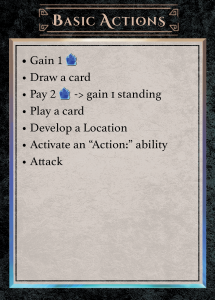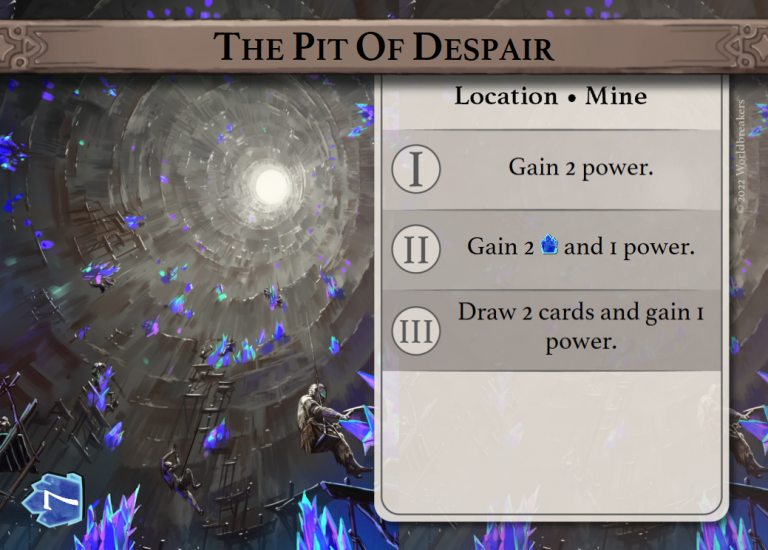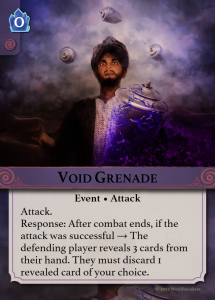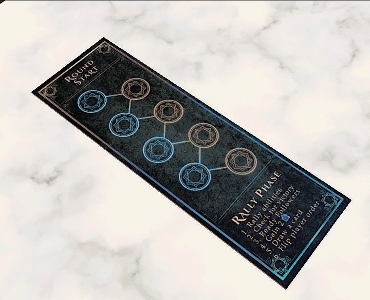My favorite card game of all time is Netrunner, the cyberpunk cat-and-mouse game from Richard Garfield (of Magic: the Gathering fame). Worldbreakers adopts heavily from Netrunner, and the greatest influence is the action-based economy.
During each Netrunner turn you get four clicks. You can use a click to take one of a long set of actions, such as gaining a credit (the game’s currency), drawing a card, or playing a card from your hand. The interchangeability of clicks, credits, and cards provides you with substantial flexibility since you always have something to do. This is in contrast with other card games, where you are at the mercy of your deck. Taking Magic: the Gathering as an example, you might draw too few land cards and be unable to play your spells, or draw too much and have no way to interact with the board. This will almost never happen with Netrunner since you can always click for a credit or for another card.
Worldbreakers follows this same structure. You get four turns every round, with one action per turn. As with Netrunner, possible actions include gaining a mythium (which is the Worldbreakers currency) and drawing cards.

Worldbreakers has three unique actions:
- Buying a standing with one of the game’s four guilds, which unlocks access to more powerful cards in your deck.
- Developing a location, triggering one of its stage abilities. These typically provide power (the points that win you the game) along with different resources and effects.
- Attacking your opponent with followers, gaining you power and damaging their locations.

The flexibility of Netrunner is also one of the game’s drawbacks. Since clicks can do anything, from gaining resources through playing cards to interacting with your opponent, deciding how to sequence them is hard. This leads to long turns where the active player is pondering how best to organize their time. Meanwhile, the other player has no clicks of their own. Furthermore, there are very few available interaction options on your opponent’s turn. You almost always have to wait for your turn to react or counter their move. This leads to a combination of downtime and limited interaction, a recipe for a potentially frustrating play experience.
Enter the turn tracker:
In Worldbreakers, you and your opponent alternate taking turns. After each of your moves, your opponent gets an opportunity to make their own. This snakelike structure keeps the flexibility and sequencing puzzle from Netrunner, and adds the tension of predicting what your opponent will do so you can time your key decisions accordingly. Downtime is minimal and gameplay feels like a race. With every action, each player is sprinting just slightly ahead of the other.

When you play the Void Grenade event, you immediately attack your opponent. Then, if the attack is successful (at least one follower gets through), you discard one of the cards in their hand, disrupting their plans.
Another cool mechanic is that the turn tracker flips at the end of the round:

The first player is now second and vice versa. If you had the last turn the previous round, you will have the first turn this round, effectively getting two turns in a row. One way to take advantage of this dynamic is to play a follower on your last turn. You can start the new round by attacking your opponent who did not get a chance to mount a defense. Just remember that they will have the opportunity to respond in kind when they get their two consecutive turns!
Worldbreakers revolves around balancing resources and risk. You want to establish a strong board position before starting to gain power. However, your opponent is advancing their own agenda in parallel. Speaking of which, the next blog post will discuss how the Netrunner agenda mechanic influenced the Worldbreakers location cards, a central venue for winning the game.